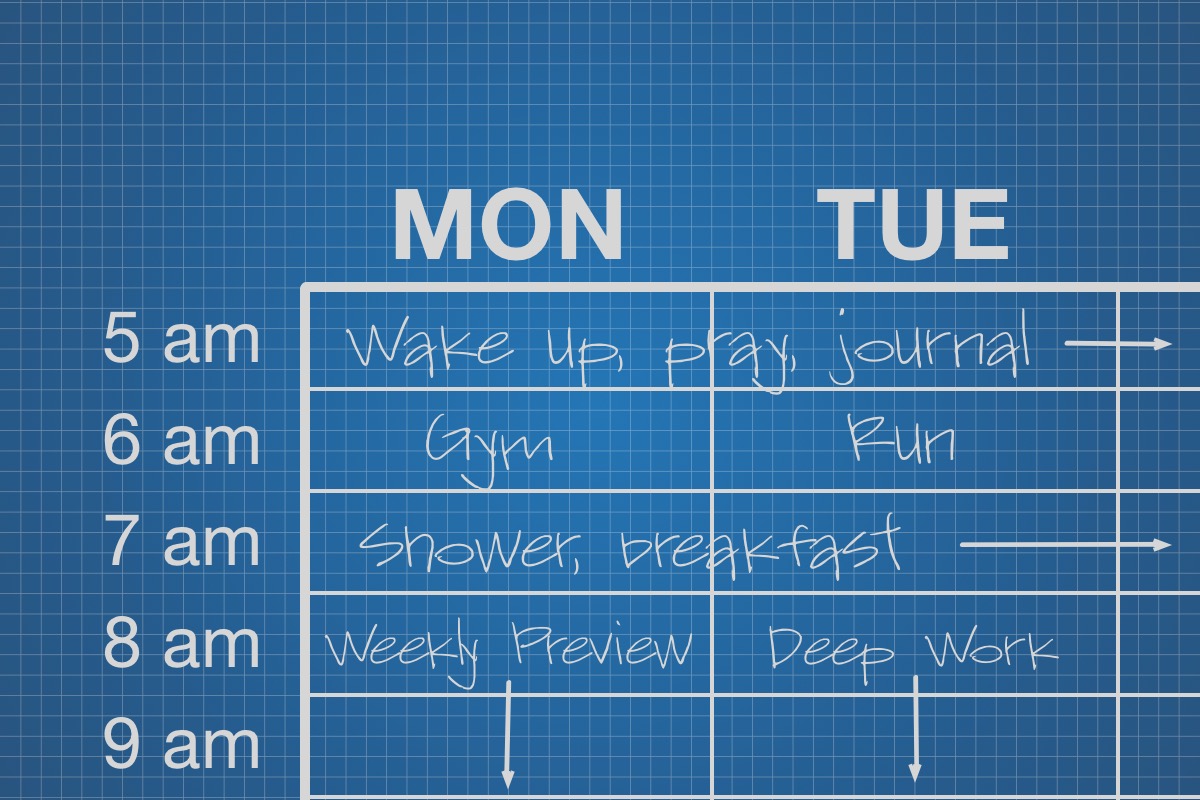What if you could schedule next week exactly the way you wanted to?
It’s still a regular work week. You’re not on vacation or anything like that. But instead of the clock and other people setting your schedule, you get to decide when and how you work, rest, and play.
For most of us, our weekly schedules look pretty much the same. There may be some variation week-to-week, especially if you have an irregular work schedule, but the basic structure is there. We don’t start from a blank canvas every time we sit down to plan the coming week. Work goes here, fun goes here, church goes here. This is where we sleep. And there’s often a bunch of dead zones in between.
Whether you’ve designed it or drifted into it, you have a blueprint for the week. You use this blueprint every time you need to schedule a task or appointment.
In Time Traps, Todd Duncan introduces the concept of an ideal week. By intentionally designing your week with large blocks of uninterrupted time, you can focus on the big rocks. You’re creating boundaries for the gravel so it doesn’t take over your calendar.
Duncan only focuses on creating a blueprint for the work week, but life doesn’t get less chaotic at 5pm. Some of the most important work we do is not at work; our time at home needs to be planned and considered as carefully as the time we spend at the office.
I know what you’re thinking: Putting up with a calendar at work is bad enough. When I go home, I want to relax and be flexible! Agreed. Planning allows you to be more flexible and relax with a clear conscience, knowing that what you need to do is still going to get done.
Start your blueprint with an empty week. So you’re not starting from a blank piece of paper, you can download a template to get started.
Now start setting aside time for everything you want to do.
- Sleep. If we’re not getting enough sleep, we’re going to have a hard time getting anything else done. What time do you want to get up in the morning? What time do you want to go to bed? Do you want to keep a different schedule on the weekends? What about naps?
- Work. Work is a major commitment of our time, and it should probably be the next thing you add to your blueprint. Be specific in how you break down the time spent at work, too. When are you most creative and energized? Reserve those periods for your best creative deep work. Give gravel its home. Don’t forget to include a breakout block.
- Self-care. How much time do you spend getting ready in the morning? Make sure your morning routine fits between when you wake up and when you leave for work. When are you going to exercise? What time do you need to start winding down so you’re ready for bed when it’s bedtime? (Schedule Do Not Disturb and Night Shift accordingly.)
- Rest and Re-creation. Don’t leave the best parts of life to chance. Build them into your schedule! When are you going to spend quality time with your family? When will you get together with friends? When will you work on your hobbies?
Don’t feel bad if you have more ideas than will fit in the 168 hours you have in the week. The first time I designed my ideal week, I had about 200 hours I wanted to fit on that page. The cuts are hard. Remember: You can do anything you want, but not everything.
Every week isn’t going to look like your ideal week. That’s okay! Be flexible, especially at the beginning. You’ll likely revisit this in a month or two and update your plan as you see what works. You’ll also want to update your ideal week as your ideals change.
The most important benefit I’ve seen from planning out my ideal week is that it gives me a direction. As I plan each week, I have a better sense of where the pieces should fit. I know I’m giving adequate time to each area of my life. When a new opportunity arises, I am better prepared to either make room for it, or say no, and know that I made the right call.
Question: What does your ideal week look like? Share your thoughts in the comments, on Twitter, LinkedIn, or Facebook.


